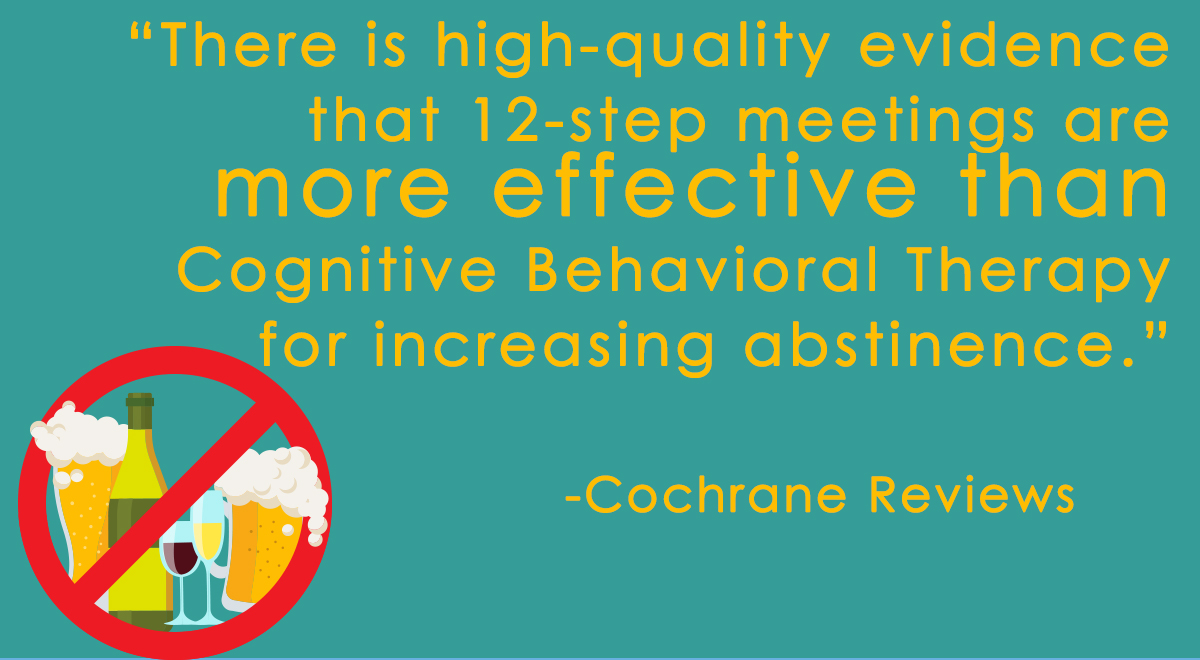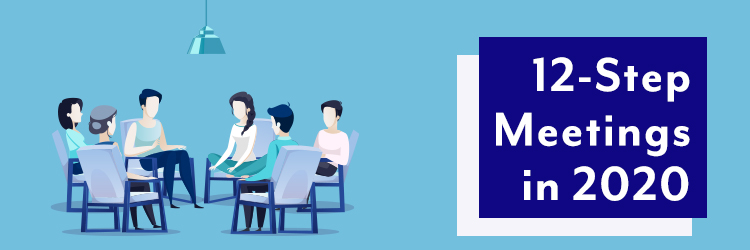Those who got sober through the 12 steps were excited to hear last week that Alcoholics Anonymous – long criticized for lacking scientific evidence to back its effectiveness – got a stamp of approval from the Cochrane Reviews. What does that mean exactly? The Cochrane Database for Systematic Reviews is a leading healthcare journal. The database documents reviews in the healthcare field as part of the Cochrane Library. A recent set of 27 studies with 10,565 participants concluded that “there is high-quality evidence that manualized AA/TSF [twelve step facilitations] interventions are more effective than other established treatments such as Cognitive Behavioral Therapy, for increasing abstinence.”
What does this mean for AA?
 In recovery, people tend to be all about, or not-at-all-about, the 12 steps. Sure, treatment providers who might not have typically suggested 12-step programs for long-term aftercare might begin doing so. But I doubt that anyone already in long-term recovery will start to attend 12-step meetings simply based on this review. As for the people who are already experiencing success through AA, the steps are already making positive changes in their lives. It’s not as though they needed any more convincing. I should point out that the study concluded 12-step programs were more effective for increasing abstinence, and not for treating co-occurring disorders. In addition to being in recovery, I experience generalized anxiety disorder and major depressive disorder. For me, the 12 steps and CBT are each necessary. One flails without the other. There is no doubt this research is a boon for AA. But there still needs to be more conversation about different (or additional) recovery models for those who are struggling to stay sober by using the anonymous programs. My takeaway? Good for AA Let this research be further proof (in addition to the thousands of people who have recovered using it) of its effectiveness. Let AA exist on the same shelf of resources as S.M.A.R.T. Recovery, Cognitive Behavioral Therapy or Dialectical Behavioral Therapy, and even Medication-Assisted Treatment. The study and its results will probably not sway people’s opinion one way or the other. The more interesting development going on in 12-step fellowships is their swift adaptation to online and phone-in meetings amid the Coronavirus outbreak.
In recovery, people tend to be all about, or not-at-all-about, the 12 steps. Sure, treatment providers who might not have typically suggested 12-step programs for long-term aftercare might begin doing so. But I doubt that anyone already in long-term recovery will start to attend 12-step meetings simply based on this review. As for the people who are already experiencing success through AA, the steps are already making positive changes in their lives. It’s not as though they needed any more convincing. I should point out that the study concluded 12-step programs were more effective for increasing abstinence, and not for treating co-occurring disorders. In addition to being in recovery, I experience generalized anxiety disorder and major depressive disorder. For me, the 12 steps and CBT are each necessary. One flails without the other. There is no doubt this research is a boon for AA. But there still needs to be more conversation about different (or additional) recovery models for those who are struggling to stay sober by using the anonymous programs. My takeaway? Good for AA Let this research be further proof (in addition to the thousands of people who have recovered using it) of its effectiveness. Let AA exist on the same shelf of resources as S.M.A.R.T. Recovery, Cognitive Behavioral Therapy or Dialectical Behavioral Therapy, and even Medication-Assisted Treatment. The study and its results will probably not sway people’s opinion one way or the other. The more interesting development going on in 12-step fellowships is their swift adaptation to online and phone-in meetings amid the Coronavirus outbreak.
Online 12-step meetings
12-step meetings generally do a good job keeping up with the times, so online AA meetings are nothing new. But the level at which in-person meetings are temporarily switching to an online format is unprecedented in the history of AA. Early this week the CDC said that groups of 10 or more people ought to be avoided. That means many 12-step meetings would be breaking this recommendation if they continued to meet in person. Alcoholics Anonymous continues to monitor the situation and releases updates regarding COVID 19 on its website. There is, of course, the concern for newcomers and longtime members who might be struggling. During hard times and in early sobriety, people with substance use disorders lean heavily on the support they receive at meetings.That connection with another addict or alcoholic can be the difference between sobriety or alcohol abuse. While the online meetings might not be able to replicate person-to-person connection, they are at least an effort to maintain any kind of connection at all.
Drug and Alcohol Treatment Near Me
At TruHealing Centers, we know that recovery and sobriety is not a one-size-fits-all hat. That is why our facilities offer individualized treatment programs for each client based on where they are in their recovery journey. Whether you are in search of an inpatient program or long-term aftercare our treatment centers can provide the behavioral health and medical care you need. To learn about which one of our treatment facilities, and which level of health care is the right fit for you, contact an admissions specialist today at 833 – 216 – 3079.








